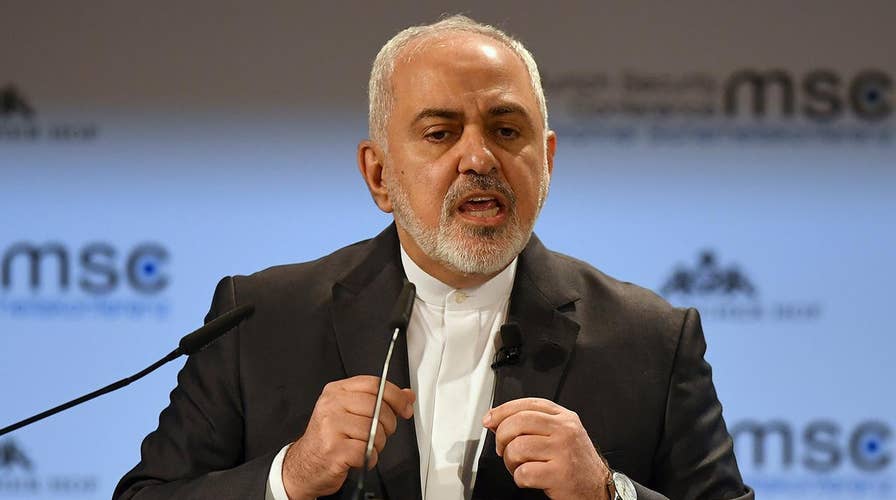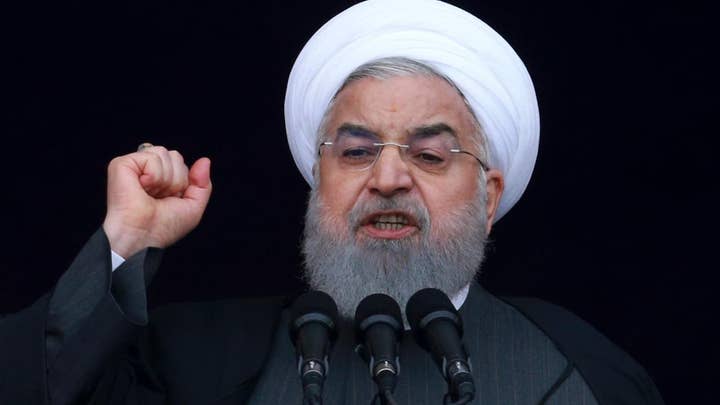Iran's state-run media says Foreign Minister Mohammad Javad Zarif has resigned
Zarif was the driving force behind Iran's 2015 nuclear deal with world powers.
Iran Minister of Foreign Affairs Javad Zarif, one of the top officials involved in the rogue nation's controversial 2015 nuclear deal, announced his resignation Monday after five-and-a-half years in the position.
The state-run IRNA news agency confirmed that Zarif had announced his resignation on his Instagram page. The 59-year-old wrote he was "very grateful to the gracious love of the dear and brave people of Iran for the last 67 months" and apologized for "the incapacity to continue serving and all the shortcomings during the service."
The post -- which included a drawing of Fatima, the daughter of the Muslim Prophet Muhammad -- did not specify why Zarif was stepping down.
U.S. Secretary of State Mike Pompeo tweeted Monday evening: "We note [Zarif's] resignation. We’ll see if it sticks. Either way, he and [Iran President] @HassanRouhani are just front men for a corrupt religious mafia. We know [Supreme Leader Ayatollah Ali Khamenei] makes all final decisions. Our policy is unchanged — the regime must behave like a normal country and respect its people."
Earlier Monday, Zarif met with members of the activist group Code Pink in Tehran, smiling as he posed for a photograph with them. However, he was not seen in images later in the day showing Syrian President Bashar Assad meeting with Khamenei and Rouhani. Iran has been one of Assad's main supporters during the years-long war in Syria.
Zarif, who was named foreign minister in August 2013, was the driving force behind the nuclear deal with six world powers, including the United States. That deal is now on the verge of collapse after President Donald Trump withdrew America from the accord last year. His resignation leaves Iranian President Hassan Rouhani without one of his main allies in pushing the Islamic Republic toward more negotiation with the West. Analysts have said Rouhani faces growing political pressure from hard-liners within the government as the unraveling nuclear deal further strains the country's long-weakened economy.
On Sunday, Zarif criticized Iranian hard-liners in a speech in Tehran, saying: "We cannot hide behind imperialism's plot and blame them for our own incapability."
"Independence does not mean isolation from the world," he said.
IRAN CELEBRATES ISLAMIC REVOLUTION WITH THREATS TO US, VOWS TO BOOST BALLISTIC MISSILES
Reaction to Zarif's resignation in Iran was swift. A prominent reformist lawmaker, Mostafa Kavakebian, wrote on Twitter that Rouhani should reject Zarif's resignation as his departure would only "make enemies of Iran's dignity happy."
Hassan Mohammadi, a Tehran-based political analyst close to Rouhani, said he understood it was Zarif's third time submitting his resignation in the last year.
"It is part of [the] plan for changing the track in foreign policy in Iran. A negotiation-seeking foreign minister is not a favored person anymore," Mohammadi told The Associated Press. "Iran needs a tough foreign minister from now on. Someone who does not offer [a] smile towards the West."
Zarif was born in Iran but came to the United States in the late 1970s for secondary school. He received a bachelor's degree and a master's degree from San Francisco State University and a second master's degree and a Ph.D. from the University of Denver.
Prior to becoming foreign minister, Zarif served as Iran's ambassador to the United Nations between August 2002 and July 2007, first under reformist President Mohammad Khatami and then under hardline President Mahmoud Ahmadinejad.
Ahmadinejad reportedly wanted Zarif replaced, but Supreme Leader Ayatollah Ali Khamenei intervened to keep him in the position for another two years as Iran soon found itself an international pariah over its nuclear program. Iran insisted its atomic program was for peaceful purposes only, while the West feared it could be used to make nuclear weapons.
CLICK HERE TO GET THE FOX NEWS APP
Secret backchannel talks between the United States and Iran in Oman became full-fledged negotiations over its nuclear program. During the talks, Zarif met with then-U.S. Secretary of State John Kerry more than 50 times -- something unimaginable only years earlier.
Kerry and Zarif's rapport extended beyond just the nuclear negotiations, however. Kerry directly reached out to his counterpart in January 2016 to help secure the release within 24 hours of 10 U.S. Navy sailors seized by Iran after they mistakenly entered Iranian territorial waters.
The Associated Press contributed to this report.










































